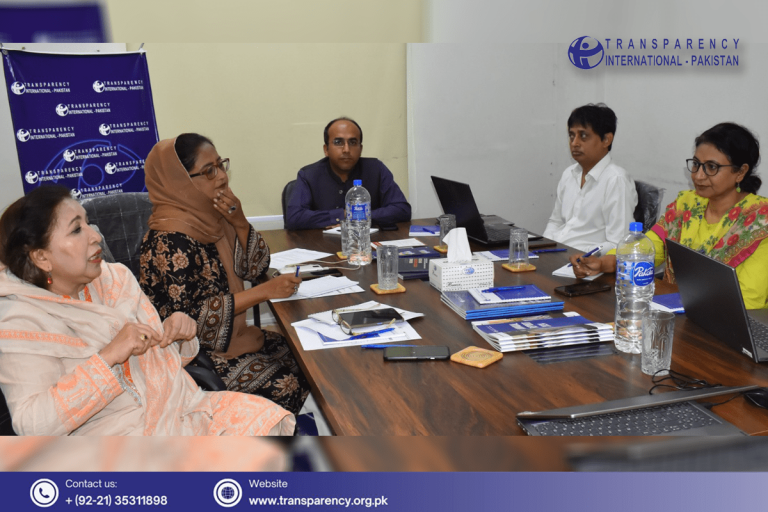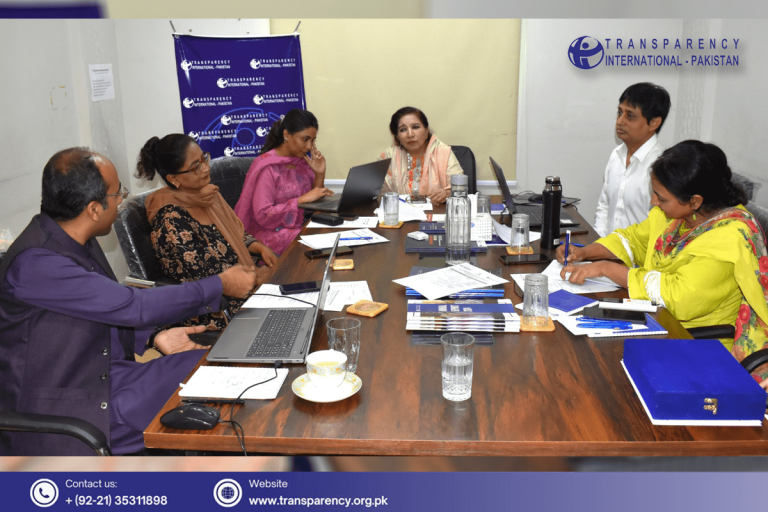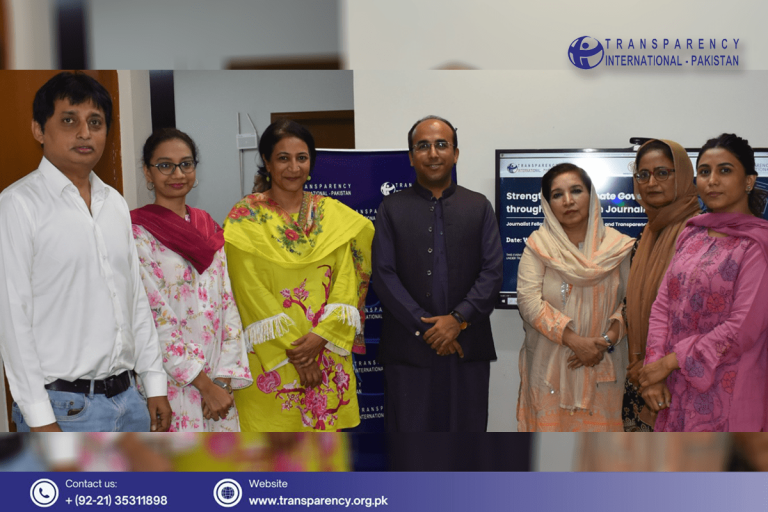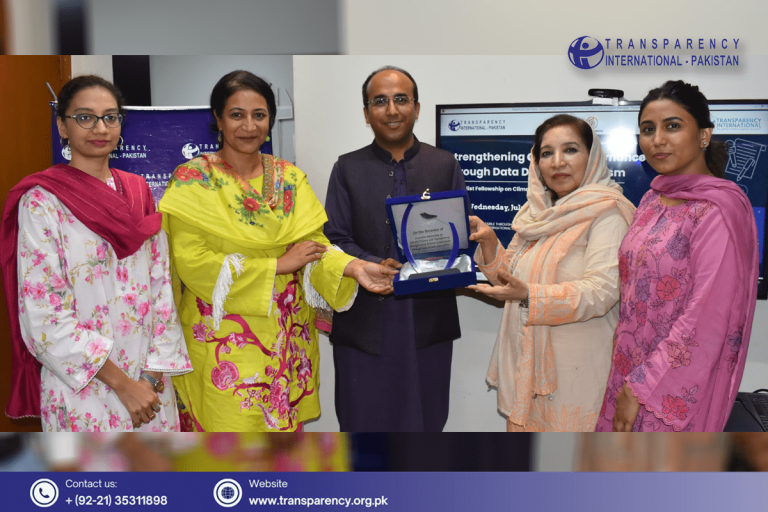Journalist Fellowship on Climate Finance and Transparency - Module 02: Strengthening Climate Governance through Data-Driven Journalism
Journalist Fellowship on Climate Finance and Transparency – Module 02: Strengthening Climate Governance through Data-Driven Journalism
Venue: TI Pakistan Office, Karachi / Online
Date: Wednesday, July 30, 2025
Transparency International Pakistan conducted the second module of its ongoing Journalist Fellowship on Climate Finance and Transparency, titled “Strengthening Climate Governance through Data-Driven Journalism”. The session took place on July 30, 2025, in a hybrid format with fellows joining both in person and online. The objective of the training workshop was to empower journalists with data tools and techniques to enhance their climate reporting, enabling them to produce impactful, localized stories on climate change and its associated challenges.
The workshop commenced with recitation of Holy Quran. Ms. Fariha Fatima, Programme Associate, TI Pakistan welcomed the participants and provided a recap of the fellowship program. She highlighted that the first module focused on the introduction of climate finance landscape in Pakistan, a comprehensive overview of Sindh’s worsening climate vulnerability and introduction of the tools for tracking, monitoring, and reporting on climate finance flows.
The first session of the workshop focused on “Enhancing Climate Reporting with the Right Tools and Techniques”. The session was led by Ms. Shabina Faraz, Senior Journalist, BBC Urdu and The Third Pole. In her technical and interactive in-depth session, she emphasized that the role of climate journalists must evolve beyond disaster reporting to include investigations, storytelling, and analysis rooted in data, lived realities, and accountability frameworks. She introduced participants to both global and local data platforms that could support more robust and evidence-based reporting.
She shared key techniques for impactful climate journalism. First she began with the importance of localizing the story by providing context at the local or district level and highlighting specific vulnerabilities and gaps. Secondly, she emphasized that effective reporting should also humanize the story by capturing the human impact of climate change, documenting personal accounts, community experiences, destruction caused by climate events, and instances of migration or displacement. Third, she stressed that journalists should go beyond highlighting problems and also propose solutions and recommendations, exploring strategies, innovations, or community-driven actions that can address the identified challenges.
Based on the techniques shared in the session, an interactive activity titled “Think Global, Report Local” was conducted. Participants were divided into four groups, each focusing on a specific thematic area: reporting and accessing data on carbon markets, accessing data on climate finance, using the Right to Information (RTI) laws for climate stories, and addressing local environmental governance issues. Group leaders guided the participants on approaches, tools, and resources relevant to their assigned themes, encouraging them to apply the discussed techniques in developing practical and localized story ideas.
In her follow-up session, “Pitching and Writing for Climate Impact,” Ms. Shabina provided practical advice on how to develop concise, compelling climate story pitches. She walked fellows through narrative structure, creative headline writing, and the importance of short, engaging paragraphs supported by credible sources. She emphasized the importance of starting with a strong, engaging title and a clear opening sentence that summarizes the core message. Participants were encouraged to organize their stories into concise sections with sub-themes, maintain clarity by using short sentences, and ensure every paragraph develops a single idea. She reiterated the need for accuracy, urging journalists to back up every claim with credible sources and to conduct thorough fact-checks before publication. The session also touched on tailoring story pitches to specific audiences and outlets, making them both relevant and impactful, while keeping a focus on solutions, accountability, and the human dimensions of climate change.
Next, Ms. Raima Mehmood, Policy and Research Coordinator, TI Pakistan, delivered a presentation titled “Greenwashing in Carbon Markets.” She explained how some companies and even governments misuse carbon offset mechanisms to present a misleading image of climate responsibility. By relying on carbon credits that are of low quality, unverified, or do not lead to real emission reductions, these actors create the illusion of climate action while continuing environmentally harmful practices. Ms. Mehmood explained that such deceptive behavior undermines the credibility of carbon markets and allows polluters to avoid making meaningful changes.
She emphasized the important role of journalists in uncovering these practices. Rather than simply repeating corporate claims, she urged them to ask critical questions such as: Where are these carbon credits coming from? Are they certified by credible and independent standards? Do they represent real and additional emission reductions? Have the communities affected by these projects been properly consulted and compensated? She encouraged journalists to go beyond surface-level reporting and investigate the integrity behind climate-related claims, especially when carbon credits are being used to justify continued emissions.
During the discussion, journalists raised a key concern about who is responsible for monitoring greenwashing in carbon markets. In response, Ms. Raima explained that while some voluntary standards like Verra and the Gold Standard offer frameworks for verifying projects, there is still a significant gap in consistent oversight. She noted the absence of strong regulatory bodies at both national and international levels and called for more robust institutional mechanisms, including government regulators and independent watchdogs, to ensure transparency and accountability in carbon market practices.
Moving forward, Mr. Kashif Ali, Executive Director, Transparency International Pakistan, delivered a comprehensive presentation on “Telling Compelling Climate Finance Stories.” He emphasized the power of storytelling in making complex climate finance data accessible and impactful. He explained that stories help people see where climate finance is spent, which sectors benefit, and how public money is used, turning complex numbers into real-life examples. Highlighting tools such as climate budget tagging and procurement monitoring, he encouraged journalists to trace the flow of funds and link them to tangible community-level outcomes.
Mr. Kashif also shared practical writing tips to enhance reader engagement, including the use of creative and compelling titles, concise sentences, short paragraphs, and clear sub-themes. In addition, he introduced participants to readily accessible data sources such as federal and provincial budget data, climate budget tagging information from the Ministry of Finance, budget strategies from various ministries, and procurement data.
To illustrate these techniques, he discussed a case study based on the Dawn article “The climate finance boom and why Pakistan is missing out”. The piece exemplifies effective climate finance storytelling by pairing a strong, attention-grabbing headline with a compelling opening hook, linking the global $2 trillion climate finance milestone in 2024 to Pakistan’s limited progress. It blends hard data with contextual analysis, shedding light on institutional and strategic gaps that prevent the country from translating pledges into tangible projects. This example demonstrated how journalists can combine global developments with local realities to craft impactful narratives that resonate with audiences and promote accountability.
The workshop concluded with brief closing remarks by Ms. Nasreen Memon, Project Coordinator, TI Pakistan. She appreciated the fellows’ active participation and encouraged them to apply their learnings in upcoming assignments. She highlighted that as climate change increasingly intersects with governance, finance, and development, the role of journalists in scrutinizing public claims, unpacking data, and translating complex issues into accessible narratives has never been more critical.
The session provided clarity on the evolving role of journalists in navigating the complexities of climate governance, finance, and data transparency. Participants actively engaged in discussions, raising critical points around challenges in accessing climate finance data at the provincial level, the lack of localized reporting on carbon markets, and the need for stronger links between national climate policies and on-ground impacts. The session reinforced the importance of local storytelling, cross-sectoral collaboration, and journalistic responsibility in holding climate actors accountable.
The session concluded with a certificate distribution ceremony, recognizing the fellows’ active participation and commitment to strengthening climate journalism in Pakistan.




